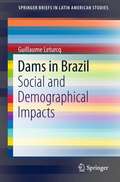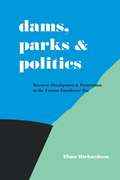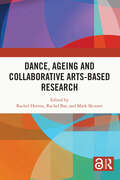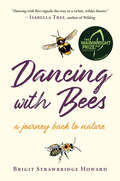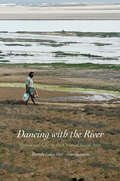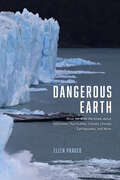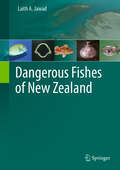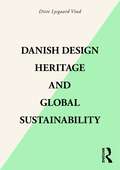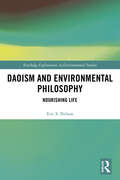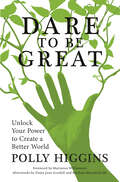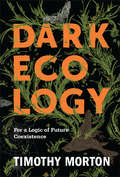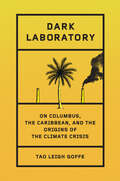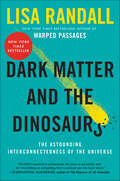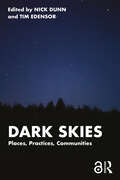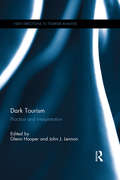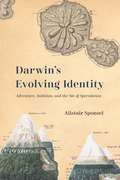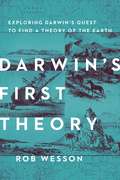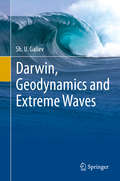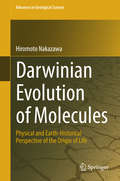- Table View
- List View
Dams in Brazil: Social and Demographical Impacts (SpringerBriefs in Latin American Studies)
by Guillaume LeturcqThe book focuses on the human and social effects of the construction of hydroelectric dams in Brazil. It discusses themes such as forced migrations, how the families of the victims of the dams adapt to new living areas, the struggle of families with the relocation of their homes and the fact that they are neglected by builders and government. These discussions are carried out in a comparative perspective between Southern and Northern Brazil, where contexts and living conditions are quite different. The book's main objective is to analyze the movements, adaptations and life changes in families suffering from the effects of dams throughout Brazil. This is the first book that analyzes the relationship dam-space with the intent to understand how dams affect the territory. The book is organized in three chapters: the dams’ effects in Brazil and the territorial impacts; human and social consequences of dam construction; a regional comparison of the effects of dams between the South and the North of the country.
Dams, Parks, and Politics: Development and Preservation In the Truman-Eisenhower Era
by Elmo RichardsonThis book is a chronicle of the myopia and gamesmanship that dominated Americans' understanding of their environment on the eve of the nation's ecology crisis. Based almost entirely on primary sources, Elmo Richardson's study examines the interplay between the national policies and programs for development and preservation of natural resources in the centralist Truman administration and the localist, enterprise-oriented Eisenhower administration. He shows that the decade examined brought about very little change in the values held by federal policy makers. Although the development of resources was a prominent issue in the elections of 1948, 1952, and 1956, what emerges from Richardson's account is the shallowness of understanding on the part of the decision makers and the public, and the ease with which policy direction could be deflected. The book demonstrates the persistence of the tradition of development and the nonpartisan character of the movement for preservation, which crossed party lines, regional lines, and economic interest groups.
Dance for Two
by Alan LightmanThe author of Einstein's Dreams now presents a collection of essays, written over the past 20 years, that displays his genius for bringing literary and scientific concerns into ringing harmony. Sometimes provocative, sometimes fanciful, always elegantly conceived and written, these meditations offer readers a fascinating look into the creative compulsions shared by the scientist and the artist. Reading tour.From the Trade Paperback edition.
Dance, Ageing and Collaborative Arts-Based Research
by Mark Skinner Rachel Herron Rachel BarDance, Ageing and Collaborative Arts-Based Research contributes a critical and comprehensive perspective on the role of the arts –specifically dance – in enhancing the lives of older people. The book focuses on the development of an innovative arts-based program for older adults and the collaborative process of exploring and understanding its impact in relation to ageing, social inclusion, and care. It offers a wide audience of readers a richer understanding of the role of the arts in ageing and life enrichment, critical contributions to theories of ageing and care, specific approaches to arts-based collaborative research, and an exploration of the impact of Sharing Dance from the perspective of older adults, artists, researchers, and community leaders. Given the interdisciplinary and collaborative nature of this book, it will be of interest across health, social science, and humanities disciplines, including gerontology, sociology, psychology, geography, nursing, social work, and performing arts. Licence line: Creative Commons Attribution-Non Commercial-No Derivatives 4.0 license.
Dancing with Bees: A Journey Back to Nature
by Brigit Strawbridge HowardSHORTLISTED FOR THE 2020 WAINWRIGHT PRIZEThe Sunday Times Best Nature Writing Books 2020A naturalist&’s passionate dive into the lives of bees (of all stripes)—and the natural world in her own backyardBrigit Strawbridge Howard was shocked the day she realised she knew more about the French Revolution than she did about her native trees. And birds. And wildflowers. And bees. The thought stopped her—quite literally—in her tracks. But that day was also the start of a journey, one filled with silver birches and hairy-footed flower bees, skylarks, and rosebay willow herb, and the joy that comes with deepening one&’s relationship with place. Dancing with Bees is Strawbridge Howard&’s charming and eloquent account of a return to noticing, to rediscovering a perspective on the world that had somehow been lost to her for decades and to reconnecting with the natural world. With special care and attention to the plight of pollinators, including honeybees, bumblebees, and solitary bees, and what we can do to help them, Strawbridge Howard shares fascinating details of the lives of flora and fauna that have filled her days with ever-increasing wonder and delight.
Dancing with the River
by Kuntala Lahiri-Dutt Gopa SamantaWith this book Kuntala Lahiri-Dutt and Gopa Samanta offer an intimate glimpse into the microcosmic world of "hybrid landscapes." Focusing on chars--the part-land, part-water, low-lying sandy masses that exist within the riverbeds in the floodplains of lower Bengal--the authors show how, both as real-life examples and as metaphors, chars straddle the conventional categories of land and water, and how people who live on them fluctuate between legitimacy and illegitimacy. The result, a study of human habitation in the nebulous space between land and water, charts a new way of thinking about land, people, and people's ways of life.
Dangerous Earth: What We Wish We Knew about Volcanoes, Hurricanes, Climate Change, Earthquakes, and More
by Ellen PragerThe Earth is a beautiful and wondrous planet, but also frustratingly complex and, at times, violent: much of what has made it livable can also cause catastrophe. Volcanic eruptions create land and produce fertile, nutrient-rich soil, but they can also bury forests, fields, and entire towns under ash, mud, lava, and debris. The very forces that create and recycle Earth’s crust also spawn destructive earthquakes and tsunamis. Water and wind bring and spread life, but in hurricanes they can leave devastation in their wake. And while it is the planet’s warmth that enables life to thrive, rapidly increasing temperatures are causing sea levels to rise and weather events to become more extreme. Today, we know more than ever before about the powerful forces that can cause catastrophe, but significant questions remain. Why can’t we better predict some natural disasters? What do scientists know about them already? What do they wish they knew? In Dangerous Earth, marine scientist and science communicator Ellen Prager explores the science of investigating volcanoes, earthquakes, tsunamis, hurricanes, landslides, rip currents, and—maybe the most perilous hazard of all—climate change. Each chapter considers a specific hazard, begins with a game-changing historical event (like the 1980 eruption of Mt. St. Helens or the landfall and impacts of Hurricane Harvey), and highlights what remains unknown about these dynamic phenomena. Along the way, we hear from scientists trying to read Earth’s warning signs, pass its messages along to the rest of us, and prevent catastrophic loss. A sweeping tour of some of the most awesome forces on our planet—many tragic, yet nonetheless awe-inspiring—Dangerous Earth is an illuminating journey through the undiscovered, unresolved, and in some cases unimagined mysteries that continue to frustrate and fascinate the world’s leading scientists: the “wish-we-knews” that ignite both our curiosity and global change.
Dangerous Fishes of New Zealand
by Laith A. JawadAmong the aims of the present book is to educate locals about the danger of this group of fishes as part of a public education and awareness program that should be initiated in the coastal areas. It is therefore important to identify and assess the hazards posed by various fishes in each region and bring the results to public attention. In addition, at locations where hazards involving dangerous fish have been identified, procedures should be developed for treating any injuries sustained. This book will be a reference book to both Academic and students in different disciplines of knowledge to use in their research on fishes of New Zealand and the Pacific. The scholars interested in fish fauna of New Zealand will use this book as a guide to compare the dangerous fish fauna of New Zealand with those of the other parts of The Pacific regions.
Dangerous Neighbors: Volcanoes and Cities
by Grant Heiken Jody Heiken Julie Wilbert Grant Heiken Jody HeikenWhat are the real risks posed by a volcanic eruption near a city - what is fact and what is myth? How have volcanic eruptions affected cities in the past, and how can we learn from these events? Why do communities continue to develop in such locations, despite the obvious threat? In this fascinating book, Grant Heiken explores global examples of cities at risk from volcanoes, from Italy, the US, Mexico, Ecuador, The Philippines, Japan and New Zealand, providing historical and contemporary eruption case studies to illustrate volcanic hazards, and cities' efforts to respond to them, both good and poor. He shows that truly successful volcanic hazard mitigation cannot be accomplished without collaboration between experts in geology and natural hazards, public health, medicine, city and infrastructure planning, and civil protection. This is a topical and engaging read for anyone interested in the history and future activity of these dangerous neighbors.
Danish Design Heritage and Global Sustainability
by Ditte Lysgaard VindWith a bias for action, this book offers valuable insights into the origins of the much-celebrated Danish design tradition and how it can be employed to create design solutions to address today’s environmental crisis using the planetary boundaries as positive creative constraints. Danish design has long been revered for its high-quality aesthetics, materials and craftmanship, encouraging sustainability without compromise. This book explores the lessons to be learnt from Scandinavian design ideals, introduces the philosophy and principles of circular economy and showcases the potential power of combining circular economy and design in helping to mitigate the effects of climate change. It presents a range of case study examples across multiple sectors and includes interviews with Danish designers from architecture, furniture, fashion, digital and industrial design, providing unique insights by some of the world’s leading contemporary designers. Bridging theory and real-world insights and experiences, this book builds on the framework of the 4Rs – The Circular Way: Reduce, Reuse, Recycle and Replace to encourage innovation through the replacement of environmentally damaging materials and business models. A must-read for product designers, industrial designers, consultants, business developers, sustainability professionals and students interested in learning how to design and implement circular, sustainable models into practice.
Daoism and Environmental Philosophy: Nourishing Life (Routledge Explorations in Environmental Studies)
by Eric S. NelsonDaoism and Environmental Philosophy explores ethics and the philosophy of nature in the Daodejing, the Zhuangzi, and related texts to elucidate their potential significance in our contemporary environmental crisis. This book traces early Daoist depictions of practices of embodied emptying and forgetting and communicative strategies of undoing the fixations of words, things, and the embodied self. These are aspects of an ethics of embracing plainness and simplicity, nourishing the asymmetrically differentiated yet shared elemental body of life of the myriad things, and being responsively attuned in encountering and responding to things. These critical and transformative dimensions of early Daoism provide exemplary models and insights for cultivating a more expansive ecological ethos, environmental culture of nature, and progressive political ecology. This work will be of interest to students and scholars interested in philosophy, environmental ethics and philosophy, religious studies, and intellectual history.
Dare to Be Great: Unlock Your Power to Create a Better World
by Jane Goodall Marianne Williamson Michael Mansfield Polly Higgins‘I know it may not yet look like it, but we are sowing the seeds of greatness for countless generations to come. That is the Great Work of our times. Yours and mine.’ This is a book unlike any other. It does not tell you what you must do, it does not set out a guide for the 10 definitive steps to becoming great by next Thursday. Dare To Be Great is both a playful, inspirational conversation and a heartfelt, lived call, daring each one of us and our society as a whole to become truly great. Celebrated Earth lawyer Polly Higgins was a luminary in the environmental justice movement as she worked to Stop Ecocide across the globe. She was a beacon for how to live the brave, bold lives that, at our best, we imagine for ourselves. This book shares insights from her own remarkable journey, inspiring us to recognise and step into a greatness within – that is not about grandiosity but something far more exciting: aligning with our unique purpose in service of a better world.
Dark Ecology: For a Logic of Future Coexistence (The Wellek Library Lectures)
by Timothy MortonTimothy Morton argues that ecological awareness in the present Anthropocene era takes the form of a strange loop or Möbius strip, twisted to have only one side. Deckard travels this oedipal path in Blade Runner (1982) when he learns that he might be the enemy he has been ordered to pursue. Ecological awareness takes this shape because ecological phenomena have a loop form that is also fundamental to the structure of how things are.The logistics of agricultural society resulted in global warming and hardwired dangerous ideas about life-forms into the human mind. Dark ecology puts us in an uncanny position of radical self-knowledge, illuminating our place in the biosphere and our belonging to a species in a sense that is far less obvious than we like to think. Morton explores the logical foundations of the ecological crisis, which is suffused with the melancholy and negativity of coexistence yet evolving, as we explore its loop form, into something playful, anarchic, and comedic. His work is a skilled fusion of humanities and scientific scholarship, incorporating the theories and findings of philosophy, anthropology, literature, ecology, biology, and physics. Morton hopes to reestablish our ties to nonhuman beings and to help us rediscover the playfulness and joy that can brighten the dark, strange loop we traverse.
Dark Hedges, Wizard Island, and Other Magical Places That Really Exist
by L Rader CrandallFrom a lost city in the desert to a cave alight with thousands of glowworms, learn about some of the most unusual places on earth and the myths, legends, and history behind each of them!Looking at places like The Skeleton Coast in Namibia, Wizard Island in the United States, and The Fairy Tale Route in Germany, The Dark Hedges and Other Magical Places that Really Exist takes young readers on a journey around the world to real places that sound straight out of fantasy. Featuring both natural and man-made wonders, this travel book combines history and storytelling to explore the far reaches of the earth.
Dark Laboratory: On Columbus, the Caribbean, and the Origins of the Climate Crisis
by Tao Leigh GoffeA groundbreaking investigation of the Caribbean as both an idyll in the American imagination and a dark laboratory of Western experimentation, revealing secrets to racial and environmental progress that impact how we live today.&“Dark Laboratory is a gargantuan, soulful work. It obliterates most of what I thought I knew about the Caribbean&’s utility to Western Wealth.&” —Kiese Laymon, New York Times bestselling author of HeavyIn 1492, Christopher Columbus arrived on the Caribbean Island of Guanahaní to find an Edenic scene that was soon mythologized. But behind the myth of paradise, the Caribbean and its people would come to pay the price of relentless Western exploitation and abuse. In Dark Laboratory, Dr. Tao Leigh Goffe embarks on a historical journey to chart the forces that have shaped these islands: the legacy of slavery, indentured labor, and the forced toil of Chinese and enslaved Black people who mined the islands&’ bounty—including guano, which, at the time, was more valuable than gold—for the benefit of European powers and at the expense of the islands&’ sacred ecologies.Braiding together family history, cultural reportage, and social studies, Goffe radically transforms how we conceive of Blackness, the natural world, colonialism, and the climate crisis; and, in doing so, she deftly dismantles the many layers of entrenched imperialist thinking that shroud our established understanding of the human and environmental conditions to reveal the cause and effect of a global catastrophe. Dark Laboratory forces a reckoning with the received forms of knowledge that have led us astray.Through the lens of the Caribbean, both guide and warning of the man-made disasters that continue to plague our world, Goffe closely situates the origins of racism and climate catastrophe within a colonial context. And in redressing these twin apocalypses, Dark Laboratory becomes a record of the violence that continues to shape the Caribbean today. But it is also a declaration of hope, offering solutions toward a better future based on knowledge gleaned from island ecosystems, and an impassioned, urgent testament to the human capacity for change and renewal.
Dark Matter and the Dinosaurs: The Astounding Interconnectedness of the Universe
by Lisa Randall“Takes readers on illuminating scientific adventure, beginning sixty-six million years ago, that connects dinosaurs, comets, DNA, and the future of the planet.” —Huffington PostIn this brilliant exploration of our cosmic environment, the renowned particle physicist and New York Times–bestselling author of Warped Passages and Knocking on Heaven’s Door uses her research into dark matter to illuminate the startling connections between the furthest reaches of space and life here on Earth.Sixty-six million years ago, an object the size of a city descended from space to crash into Earth, creating a devastating cataclysm that killed off the dinosaurs, along with three-quarters of the other species on the planet. What was its origin? In Dark Matter and the Dinosaurs, Lisa Randall proposes it was a comet that was dislodged from its orbit as the Solar System passed through a disk of dark matter embedded in the Milky Way. In a sense, it might have been dark matter that killed the dinosaurs.Working through the background and consequences of this proposal, Randall shares with us the latest findings—established and speculative—regarding the nature and role of dark matter and the origin of the Universe, our galaxy, our Solar System, and life, along with the process by which scientists explore new concepts. In Dark Matter and the Dinosaurs, Randall tells a breathtaking story that weaves together the cosmos’ history and our own, illuminating the deep relationships that are critical to our world and the astonishing beauty inherent in the most familiar things.“Randall has woven a beautiful account of how life on Earth is intimately connected to the cosmos.” —The Daily Telegraph (UK)
Dark Scenes from Damaged Earth: The Gothic Anthropocene
by Justin D. Edwards Rune Graulund Johan HöglundAn urgent volume of essays engages the Gothic to advance important perspectives on our geological era What can the Gothic teach us about our current geological era? More than just spooky, moonlit castles and morbid graveyards, the Gothic represents a vibrant, emergent perspective on the Anthropocene. In this volume, more than a dozen scholars move beyond longstanding perspectives on the Anthropocene—such as science fiction and apocalyptic narratives—to show that the Gothic offers a unique (and dark) interpretation of events like climate change, diminished ecosystems, and mass extinction.Embracing pop cultural phenomena like True Detective, Jaws, and Twin Peaks, as well as topics from the New Weird and prehistoric shark fiction to ruin porn and the &“monstroscene,&” Dark Scenes from Damaged Earth demonstrates the continuing vitality of the Gothic while opening important new paths of inquiry. These essays map a genealogy of the Gothic while providing fresh perspectives on the ongoing climate chaos, the North/South divide, issues of racialization, dark ecology, questions surrounding environmental justice, and much more.Contributors: Fred Botting, Kingston U; Timothy Clark, U of Durham; Rebecca Duncan, Linnaeus U; Michael Fuchs, U of Oldenburg, Germany; Esthie Hugo, U of Warwick; Dawn Keetley, Lehigh U; Laura R. Kremmel, South Dakota School of Mines and Technology; Timothy Morton, Rice U; Barry Murnane, U of Oxford; Jennifer Schell, U of Alaska Fairbanks; Lisa M. Vetere, Monmouth U; Sara Wasson, Lancaster U; Jeffrey Andrew Weinstock, Central Michigan U.
Dark Skies: Places, Practices, Communities
by Tim Edensor Nick DunnDark Skies addresses a significant gap in knowledge in relation to perspectives from the arts, humanities, and social sciences. In providing a new multi- and interdisciplinary field of inquiry, this book brings together engagements with dark skies from a variety of disciplinary backgrounds, empirical studies, and theoretical orientations. Throughout history, the relationship with dark skies has generated a sense of wonder and awe, as well as providing the basis for important cultural meanings and spiritual beliefs. However, the connection to darks skies is now under threat due to the widespread growth of light pollution and the harmful impacts that this has upon humans, non-humans, and the planet we share. This book, therefore, examines the rich potential of dark skies and their relationships with place, communities, and practices to provide new insights and understandings on their importance for our world in an era of climate emergency and environmental degradation. This book is intended for a wide audience. It will be of interest to scholars, students, and professionals in geography, design, astronomy, anthropology, ecology, history, and public policy, as well as anyone who has an interest in how we can protect the night sky for the benefit of us all and the future generations to follow.
Dark Tourism: Practice and interpretation (New Directions in Tourism Analysis)
by Glenn Hooper John J. LennonDark Tourism, as well as other terms such as Thanatourism and Grief Tourism, has been much discussed in the past two decades. This volume provides a comprehensive exploration of the subject from the point of view of both practice - how Dark Tourism is performed, what practical and physical considerations exist on site - and interpretation - how Dark Tourism is understood, including issues pertaining to ethics, community involvement and motivation. It showcases a wide range of examples, drawing on the expertise of academics with management and consultancy experience, as well as those from within the social sciences and humanities. Contributors discuss the historical development of Dark Tourism, including its earlier incarnations across Europe, but they also consider its future as a strand within academic discourse, as well as its role within tourism development. Case studies include holocaust sites in Germany, as well as analysis of the legacy of war in places such as the Channel Islands and Malta. Ethical and myriad marketing considerations are also discussed in relation to Ireland, Brazil, Rwanda, Romania, U.K., Nepal and Bosnia-Herzegovina. This book covers issues that are of interest to students and staff across a spectrum of disciplines, from management to the arts and humanities, including conservation and heritage, site management, marketing and community participation.
Dark Wind: A Survivor's Tale of Love and Loss
by Gordon Chaplin"Dark Wind is the true story of a whirlwind, midlife romance and two lovers' pursuit of a life of adventure on the high seas. Gordon Chaplin tells the tale of a catastrophic sailing journey he and his partner, Susan Atkinson, undertook across the Pacific Ocean. Having separately navigated broken first marriages and two decades of child-rearing, they had rediscovered passion and a thrilling new life together. But an idyllic sailing escapade through the Marshall Islands ends in tragedy when they decide to ride out a typhoon on their sailboat, Lord Jim, rather than abandon ship for the safety of the shore. By the time it is clear that the storm has altered its course toward them, it is too late to act, and they are trapped in the path of a furious tropical storm." "Did the pattern of the lovers' lives lead inexorably to disaster? And when faced with that disaster, did Chaplin acquit himself? Chaplin's brutally honest accounting of his actions and his poignant reflections on his love affair are powerful and moving."--BOOK JACKET. Title Summary field provided by Blackwell North America, Inc. All Rights Reserved
Darwin's Evolving Identity: Adventure, Ambition, and the Sin of Speculation
by Alistair SponselWhy—against his mentor’s exhortations to publish—did Charles Darwin take twenty years to reveal his theory of evolution by natural selection? In Darwin’s Evolving Identity, Alistair Sponsel argues that Darwin adopted this cautious approach to atone for his provocative theorizing as a young author spurred by that mentor, the geologist Charles Lyell. While we might expect him to have been tormented by guilt about his private study of evolution, Darwin was most distressed by harsh reactions to his published work on coral reefs, volcanoes, and earthquakes, judging himself guilty of an authorial “sin of speculation.” It was the battle to defend himself against charges of overzealous theorizing as a geologist, rather than the prospect of broader public outcry over evolution, which made Darwin such a cautious author of Origin of Species. Drawing on his own ambitious research in Darwin’s manuscripts and at the Beagle’s remotest ports of call, Sponsel takes us from the ocean to the Origin and beyond. He provides a vivid new picture of Darwin’s career as a voyaging naturalist and metropolitan author, and in doing so makes a bold argument about how we should understand the history of scientific theories.
Darwin's First Theory: Exploring Darwin's Quest For A Theory Of Earth
by Rob WessonAn acclaimed geologist leads the reader on an adventure through the landscape that absorbed and inspired Charles Darwin. Everybody knows—or thinks they know—Charles Darwin, the father of evolution and the man who altered the way we view our place in the world. But what most people do not know is that Darwin was on board the HMS Beagle as a geologist—on a mission to examine the land, not flora and fauna. Retracing Darwin’s footsteps in South America and beyond, geologist Rob Wesson treks across the Andes, cruises waters charted by the Beagle, hunts for fossils in Uruguay and Argentina, and explores sites of long vanished glaciers in Scotland and Wales. As he follows Darwin’s path—literally and intellectually—Wesson experiences the land as Darwin did, engages with his observations, and tackles the same questions Darwin had about our ever-changing Earth. Upon his return from his five-year journey aboard the Beagle, after examining the effects of earthquakes, tsunamis, volcanic eruptions, and more, Darwin conceived his theory of subsidence and uplift‚—his first theory. These concepts and attitudes—the vastness of time; the enormous cumulative impact of almost imperceptibly slow change; change as a constant feature of the environment—underlie Darwin’s subsequent discoveries in evolution. And this peculiar way of thinking remains vitally important today as we enter the human-dominated Anthropocene age. Expertly interweaving science and adventure, Darwin’s First Theory is a riveting and revelatory journey around the world with one of the greatest scientific minds in history.
Darwin, Geodynamics and Extreme Waves
by Sh. U. GalievThis book examines the reasons behind the resonant amplification of seismic and ocean waves that have the capacity to destroy cities and ocean-going vessels. Using Charles Darwin's important geophysical research as a starting point, it provides insights into the interaction between earthquakes with volcanoes, seaquake, and tsunami formation. In particular, the author details the observations that Darwin made on a powerful earthquake that occurred in Chile in 1835, noting how the famous naturalist and geologist used the concept of earthquake-induced vertical shock to explain the event's devastating impact. The book then goes on to show how Darwin's concept relates to the catastrophic results of the shallow quakes that recently destroyed Port-au-Prince (Haiti, 2010) and severely damaged Christchurch (New Zealand, 2011). In addition, the author asks whether Darwin's ideas are endorsed by the discoveries of modern science and whether the results of destructive earthquakes can be modeled using strongly nonlinear wave equations. Coverage also proposes that similar equations can be used to simulate the dynamics of many objects on the surface of the Earth, and to model the origin of the Universe, dark matter, and dark energy as strongly nonlinear wave phenomena. The book will appeal to students as well as researchers and engineers in geophysics, seismology, nonlinear wave studies, cosmology, physical oceanography, and ocean and coastal engineering. It will also be of use to those who are interested in the phenomena of natural catastrophes as well as those who want to learn more about the life and work of Charles Darwin.
Darwinian Evolution of Molecules: Physical and Earth-Historical Perspective of the Origin of Life (Advances in Geological Science)
by Hiromoto NakazawaOn the basis of thermodynamic considerations and the Earth’s historical processes, this book argues the physical inevitability of life’s generation and evolution, i.e., Why did life generate? Why does life evolve? Following an introduction to the problem, the hypothesis “Darwinian Evolution of Molecules” is proposed, which explains how, when, and where life was instigated through successive chemical reactions and the survival of selected molecules. The individual processes described are all scientifically reasonable, being verifiable by experiment. The hypothesis is supported by extensive reference to the scientific literature published in academic journals, including some experimental reports from the author’s own research group. The readers of this book will learn that the decreasing temperature of the early Earth led to a reduction in its entropy, inducing the Earth’s materials to order, which entailed ordering of the light elements as organic molecules with subsequent further ordering (i.e., evolution) to systems that can be considered alive (i.e., life). Researchers and students, as well as the non-academic audience, interested in the interdisciplinary problem of the origin of life will find suggestions and possible approaches to the scientific and conceptual problems they may be facing.
Das Eiszeitalter
by Juergen EhlersDas Eiszeitalter ist eine Zeit extremer Klimaschwankungen, die bis heute nicht beendet sind. Zeitweilig bedeckten gewaltige Inlandeismassen große Teile der Nordkontinente. Zu anderen Zeiten war die Sahara grün und von Menschen besiedelt, und der Tschadsee war so groß wie die Bundesrepublik Deutschland. Was sich im Eiszeitalter abgespielt hat, kann nur aus Spuren rekonstruiert werden, die im Boden zurückgeblieben sind. Die Eiszeit hat andere Schichten hinterlassen als andere Erdzeitalter. Dieses Buch beschreibt die Prozesse, unter denen sie gebildet worden sind und die Methoden, mit denen man sie untersuchen kann. Die Arbeit des Geowissenschaftlers gleicht der eines Detektivs, der aus Indizien den Ablauf des Geschehens rekonstruieren muss. Und diese Tätigkeit ist genauso spanned wie die eines Detektivs. Von den in diesem Buch vorgestellten Untersuchungsergebnissen werden einige hier zum ersten Mal veröffentlicht. Das Eiszeitalter ist auch der Zeitabschnitt, in dem der Mensch in die Gestaltung der Erde eingreift. Welche Veränderungen das mit sich bringt, kann jeder selbst verfolgen. Alle relevanten Daten sind frei verfügbar; dieses Buch beschreibt, wie man sie erhält. Dr. Jürgen Ehlers arbeitet seit 1978 als Quartärgeologe für das Geologische Landesamt Hamburg, wo er für die Geologische Landesaufnahme zuständig ist. Er hat darüber hinaus Forschungsprojekte im In- und Ausland durchgeführt. Zusammen mit Prof. Philip L. Gibbard, Cambridge, hat er für die International Union for Quaternary Research das Projekt ‚Extent and Chronology of Quaternary Glaciations‘ durchgeführt. Er gilt als einer der hervorragendsten deutschen Kenner der Eiszeitgeologie. Er ist Autor mehrerer Bücher über das Quartär (Enke und Wiley) und die Nordsee (WBG) und auch als Autor von Kriminalgeschichten bekannt geworden.
